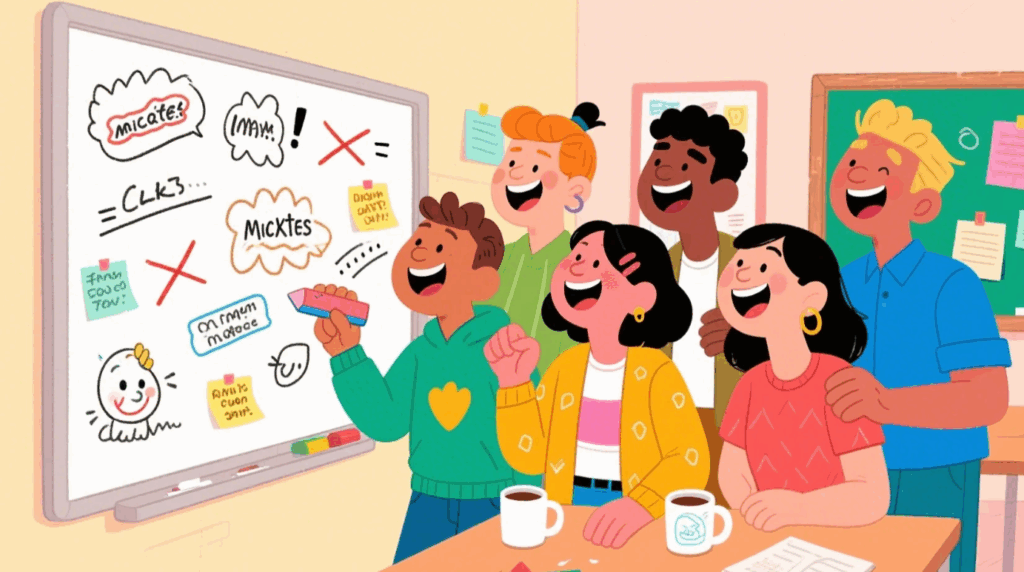We’ve all been there. We speak up in class or pitch an idea at work, and suddenly we’re sweating. What if we’re off base? What if everyone silently thinks we’re clueless? This nagging fear of being wrong can paralyze our creativity and keep us from taking healthy risks. But guess what: we don’t have to let it rule our lives. In this ultimate guide, we’ll explore why we dread goofing up, how to spot the loud little alarm bell in our heads, and clever ways to laugh off slip-ups so we can keep moving forward.

Acknowledge Our Fear
It might feel easier to ignore or downplay how anxious we get about making mistakes. But naming our fear is actually the first step toward taming it. After all, we can’t solve a problem until we admit it exists.
What Is Fear of Being Wrong?
Fear of being wrong is that jittery feeling we get when we risk looking foolish, making an embarrassing mistake, or losing control of our image. According to Verywell Mind, decidophobia—which is closely tied to this dread of making the wrong call—can become so intense that we avoid making even everyday decisions. When we’re stuck in that cycle, life starts to feel like a never-ending scary game show.
Why We Crave Certainty
Strangely enough, our brains love consistency. When things add up, we feel safe. When we’re unsure, we’re in mental limbo, and that can trigger all kinds of discomfort. This is where concepts like cognitive dissonance (the clash between what we do and what we believe) creep in, fueling our fear. Studies on cognitive dissonance show we’ll go to great lengths (sometimes bending logic) to protect our sense of “being right.” Simply acknowledging we chase certainty can help us loosen that grip on perfection.

Spot Our Triggers
Recognizing what sets us off can make the difference between moving forward and that deer-in-headlights feeling. Once we notice the patterns, we can dodge common pitfalls or handle them with less panic.
The Role of Cognitive Dissonance
You know that bubbling tension when something doesn’t align with our beliefs? That’s cognitive dissonance. It might show up as regret over a pricey purchase, confusion when we hold two conflicting views, or reluctance to admit we chose poorly. According to Harvard Business Review, high-stakes environments can amplify this tension—making us terrified of slip-ups. The more we recognize this mental tug-of-war, the more we can neutralize extreme reactions.
Our Tendency to Justify Mistakes
In everyday life, we often scramble to defend our actions even when deep down we sense something’s off. Maybe it’s the extra cookie we swore we wouldn’t have or a career pivot we’re not totally sold on. Understanding that these justifications are natural (looking at you, leftover pizza for breakfast) helps us relax. We can catch ourselves in mid-spiel and think, “Ah, there’s that justification thing again.” No big deal, just an opportunity to learn.

Laugh at Our Mistakes
Humor is an underrated superpower against fear. When we add a dash of silliness, mistakes lose a lot of their sting. Our inner critic might be loud, but a good laugh can drown it out.
Humor as a Reset Button
Ever crack a joke to ease tension when you’re nervous? That’s the magic of humor. Fear loves to blow everything out of proportion. A quick laugh shrinks it back to a friendlier size. According to Psychology Today, fear can make us overestimate threats, so reining it in with something as simple as a funny memory or silly anecdote helps us think more clearly.
Practical Tips
- Tell a friend about your blunder and ask them to top it with an even funnier mishap. You’ll learn quickly that tripping over our words happens to everyone.
- Joke with yourself: “Well, I messed up that recipe so fantastically, we might need to call NASA for help.” Give yourself gentle permission to imperfection.
- Share your progress on small fears, like how you overcame how to get over fear of public speaking. Talking about it aloud can make it less overwhelming.

Adopt a Growth Mindset
A growth mindset says mistakes are stepping stones, not sinkholes. Instead of freezing in place at the first sign of potential failure, we can mess up and move on—better and stronger each time.
Using Reframing Techniques
If you’ve been beating yourself up over every little slip, try cognitive reframing. It’s like grabbing those negative thoughts and flipping them on their heads. We say, “This challenge might be tough, but it’s a test ride for our resilience.” Research suggests that such reframing helps harness fear as motivation rather than letting it become a dead end. For real-world examples, check out how teachers at PEP reassure students that slip-ups power growth.
Celebrate Small Wins
We are quick to highlight our failures, but rarely do we high-five ourselves for the tiny victories. Whether it’s asking a question in a meeting or trying out a new hobby, each mini-success chips away at that fear of being wrong. If you need more motivation, consider strategies to tackle emotional blocks or breaking mental barriers so you can keep the celebration going.

Take It Forward
Learning to manage our fear doesn’t mean we’ll never flub up again. It just means we’ll face those slip-ups with more confidence and maybe even a chuckle. Here are a few ways to keep momentum going:
- Practice. The more we admit mistakes—and live to tell the tale—the less power they hold.
- Seek friendly feedback. Find patient people who can offer insight rather than judgment.
- Keep a “Courage Journal.” Jot down three bold moves each day, big or small. Over time, you’ll see growth in action.
- Read how others conquer hesitation, like how to stop procrastinating or how to get over a mental block in gymnastics.
We all flinch at the idea of being proven wrong. That’s normal. But the next time those pesky butterflies flutter in your stomach, remember: it’s not about being faultless, it’s about bending with the mistakes and bouncing back. After all, a good laugh at our own expense can be the secret seasoning that turns our fear into fuel. And once we master that trick, who knows what heights we’ll reach? Let’s keep exploring, keep learning, and keep finding humor in our glorious, oh-so-human mistakes.











